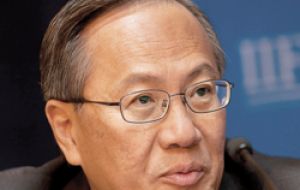MercoPress. South Atlantic News Agency
Global banks warn net outflows from emerging markets close to $800 billion
 “We have never seen something like this,” said Hung Tran from IIF. “Net outflows from emerging markets could be around $800bn this year and next”
“We have never seen something like this,” said Hung Tran from IIF. “Net outflows from emerging markets could be around $800bn this year and next” After a week of discussions at the annual IMF assembly in Peru, bankers and policy makers agreed that stemming the rush of investments from emerging markets was one of the most important challenges facing the global economy. But there was little agreement on how to actually do that.
“We have never seen something like this,” said Hung Tran, a senior executive at the Institute of International Finance, a trade group for global banks. Mr. Tran said that he was expecting net outflows from emerging markets to be around $800 billion for this year and next — by far the largest amount since institutions began investing in these markets in the late 1980s.
At the root of the debate has been whether the Federal Reserve's decision last month to hold interest rates near zero has increased investor confidence in emerging markets or hurt it.
The IMF, the first line of defense in bailing out emerging-market nations that run short of cash, has said that the Federal Reserve should refrain from an interest rate increase in light of the weak global economy. And Gary D. Cohn, the president of Goldman Sachs, said at a panel discussion in Lima that if you had just awakened from a year's long slumber and had to make a decision about raising rates, you would most likely choose not to do so.
However those on the front lines of the outflows of funds from the emerging markets — central bankers in countries like Brazil, Turkey, Malaysia and Mexico — are beginning to say that the Fed’s decision to hold back has actually made their job more difficult. That is because instead of staying put, or making new investments, investors are rushing out all the faster, spooked that the Fed has larger fears about China and other emerging markets.
“I heard time and again this week from governors of emerging-market central banks that it’s not the hike itself that worries them,” said Jacob A. Frenkel, the chairman of J.P. Morgan Chase International and the former head of Israel’s central bank. “It’s how much and when it occurs.”
Mr. Frenkel is a member of a coalition of bankers, economists and policy makers called the Group of Thirty that released a paper on Sunday criticizing the continuation of loose central bank policies. He and his colleagues who wrote the report urged the central banks — not least the Fed — to return to a more conventional approach to markets by gradually increasing interest rates.
Some experts argued that money would continue to flow out of China, the emerging market that most worries investors, regardless of whether the Fed raised rates.
For years, Chinese savers were happy to keep their wealth in the renminbi because they knew it would keep its value, said David Lubin, head of emerging-market economics at Citigroup. Now, with the renminbi expected to devalue more, “they are looking to shift into dollars,” Mr. Lubin said.
This trend will continue regardless of what the Fed does, he said.
For the IMF emerging-market governments need to regain the confidence of investors by keeping budget deficits under control and not letting their currency declines run out of control.
“Emerging-market countries have to put their own house in order,” said Ariosto Revoredo de Carvalho, a senior executive at Brazil’s central bank. “There is no cavalry here — no external help coming from China or the Fed. That puts more pressure on governments to do their own work.”
And while there have been a few calls from economists for countries most vulnerable to outflows to impose capital controls to make taking money out of these economies more difficult, most central bankers at the Lima meetings rejected such an option.
“The first thing an investor asks when he comes in is where is the exit,” said Agustín Carstens, the head of Mexico’s central bank, who was speaking on a panel about monetary policies in Latin America. “If he does not know where it is, he won’t come in.”




Top Comments
Disclaimer & comment rules-

-

-

Read all commentsThe important thing is not letting these dollars back. The dollar is no longer money, is speculation. We must run the dollar as the devil runs from the cross. Our economy is once again becoming competitive without the dollar.
Oct 15th, 2015 - 06:34 pm 0@ 1 Brasso
Oct 15th, 2015 - 07:23 pm 0There is no devil like there is no god only the crooks in the PT robbing everything in sight which is causing Brazil to go tits up.
Your despicable Chief Crook Lula and DumbAss Dilma need to be got rid of for your country to have even a small chance of recovery.
The U$D will be here far longer than the laughable REAL.
This recovery of which you speak can be translated as increased speculation. The stock market is the entry way of these dollars, so we need rules that prevent or hinder the entry in the BRICS countries.
Oct 15th, 2015 - 07:33 pm 0What about the dollar's permanence, I can say that for me it can be eternal, as long as it do not come to my country.
This language is full of pronouns ... I'm getting tired.
Commenting for this story is now closed.
If you have a Facebook account, become a fan and comment on our Facebook Page!